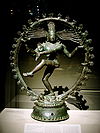Trilinga Kshetras
The etymology of Telugu is thought to have been derived from trilinga, as in Trilinga Desa, "the country of the three lingas". According to a Hindu legend, Shiva descended as linga on three mountains namely, Kaleswaram in Telangana, Srisailam in Rayalaseema and Bhimeswaram, also known as Draksharamam in Coastal Andhra, which marked the boundaries of the Telugu country. It also thought to be believed that the word Telangana derived from Telingana,Telinga, Trilinga.[1]
In Andhra Kaumudi, a Telugu grammar book it was mentioned that Āndhra Viṣhṇu having built an immense wall, connecting Sri Sailam, Bhimeswaram, and Kaleswaram, with the Mahendra hills, formed in it three gates, in which the three eyed Ishwara, bearing the trident in his hand and attended by a host of divinities resided in the form of three lingams. Āndhra Viṣhṇu assisted by divine angels having fought with the great giant Nishambhu for thirteen yugas killed him in battle and took up his residence with the sages on the banks of the river Godavari, since which time, the Telugu country has been named Trilingam.[2]
| Kshetram | Presiding Deity | District | Region | State |
|---|---|---|---|---|
| Kaleswaram | Kaleswara Mukteswara Swamy | Karimnagar District | Telangana | Telangana |
| Bhimeswaram, also known as Draksharamam | Bhimeswara Swamy | East Godavari District | Coastal Andhra | Andhra Pradesh |
| Srisailam | Mallikarjuna Swamy | kurnool District | Rayalaseema | Andhra Pradesh |
References
- ^ Grierson, G.A. (1967). Linguistic Survey of India. Delhi, India: Motilal Banarsidass. p. 576. Retrieved 12 June 2014.
- ^ A Grammar of Teloogoo Language - A D Campbell , introduction.


